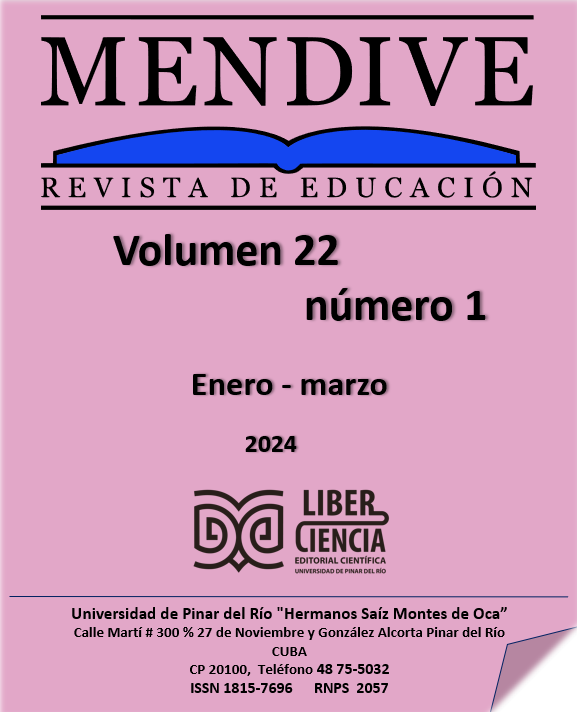The Caribbean Literature and the Intercultural Competence in the formation of Teachers of English
Main Article Content
Abstract
The development of the intercultural competence in students of foreign languages is a need today in Cuba. The intercultural competence can be developed in the experiential, but also in the teaching context. This article shows how the use of Caribbean literature, which is content of the subject History of the English-Speaking People´s Culture III contributed to the development of the intercultural competence in students of Foreign Language at the University of Pinar del Río. As theoretical methods were used: the dialectic, the historical, the logic, the systemic and the modelling; as empirical methods were used: the observation, the document analysis, the interview the pre-experiment and the descriptive statistics. A strategy composed by a set of actions focused on the use of literary texts with interactive tasks was proposed. These tasks drew students to the development of the intercultural competence. The strategy was applied with Foreign Language students from fourth year, achieving satisfactory results in terms of interculturality.
Downloads
Article Details

This work is licensed under a Creative Commons Attribution-NonCommercial 4.0 International License.
References
Arrieta Soto, M. R. (2018). La competencia comunicativa intercultural en la enseñanza-aprendizaje de lenguas extranjeras en contexto universitario: propuesta de intervención educativa. Universidad de Córdoba, UCOPress: España. https://helvia.uco.es/xmlui/handle/10396/17063
Barrett, M., Byram, M., Lázár, I., Mompoint Gaillard, P., & Philippou, S. (2014). Developing intercultural competence through education. Council of Europe Publishing. https://www.academia.edu/3150166/Developing_intercultural_competence_through_education
Borghetti, C. (2017). Is there really a need for assessing intercultural competence? Some ethical issues. Journal of Intercultural Communication, 44. https://www.academia.edu/35571859/Is_there_really_a_need_for_assessing_intercultural_competence_Some_ethical_issues
Byram, M., Gribkova, B., & Starkey, H. (2002). Developing the Intercultural Dimension in Language Teaching: A practical introduction for teachers. Language Policy Division Directorate of School, Out-of-School and Higher Education DGIV Council of Europe, Strasbourg. https://rm.coe.int/16802fc1c3
Campos Cardoso, L. M., Gallardo López, T. de J., & Urbay Rodríguez, M. (2018). La competencia intercultural integrada: Dimensiones e indicadores para su formación, guía para la secuencia de aprendizaje y los niveles de dominio de la competencia. Didasc@lia: Didáctica y Educación, 4. http://dspace.uclv.edu.cu:8089/xmlui/handle/123456789/10388
Canto-Reyes, A. S. (2023). Reflexiones acerca del inglés como principal lengua de comunicación académica. El papel de los índices internacionales y las revistas de alto impacto. La Colmena, 9. https://doi.org/10.36677/lacolmena.v0i119.19579
Ferracane, K. K. (1999) An Antology from and about English-speaking Caribbean with Introduction, Study questions, Bibliographies and Suggestions for Further Reading. Editorial de la Universidad de Puerto Rico. Pp 19-34 https://books.google.com.cu/books/about/Caribbean_Panorama.html?id=cE-tuAkFLbkC&redir_esc=y
Hofstede, G. (2011). Dimensionalizing Cultures: The Hofstede Model in Context. Online Readings in Psychology and Culture, 2(1). https://doi.org/10.9707/2307-0919.1014
Keshavarzi, A. (2012). Use of Literature in Teaching English. Procedia-Social and Behavioral Sciences, 46, 554-559. https://doi.org/10.1016/j.sbspro.2012.05.159
Martínez-Lirola, M. (2018). La importancia de introducir la competencia intercultural en la educación superior: Propuesta de actividades prácticas. Revista Electrónica Educare, 22(1), 40-58. https://doi.org/10.15359/ree.22-1.3
Montiel, L. K. (2023). Didácticas de la literatura intercultural en la educación secundaria. Franz Tamayo - Revista de Educación, 5(13), 4762. https://revistafranztamayo.org/index.php/franztamayo/article/view/1082
Pérez Morales, J. I., Hernández Cabrera, A. K., & Sánchez Fernández, D. (2019). El desarrollo de la competencia intercultural en la enseñanza de lenguas extranjeras como demanda profesional. 12. Repositorio Institucional UCLV. http://dspace.uclv.edu.cu:8089/xmlui/handle/123456789/12321
Samovar, L. A., Porter, R. E., & McDaniel, E. R. (2009). Communication between cultures. Wadsworth, Cengage Learning. ISBN-13: 978-0-495-56744-8 http://course.sdu.edu.cn/Download/6a200514-34ca-4ab0-b25b-053cae8ea852.pdf
Wu, P-H. N. & Marek, M.W. (2018). Developing Intercultural Competence via Social Media Engagement in a Language Learning Framework. Journal of Intercultural Communication, 46, ISSN 1404-1634, https://www.researchgate.net/publication/309203297_Developing_Intercultural_Competence_via_Social_Media_Engagement_in_a_Language_Learning_Framework


